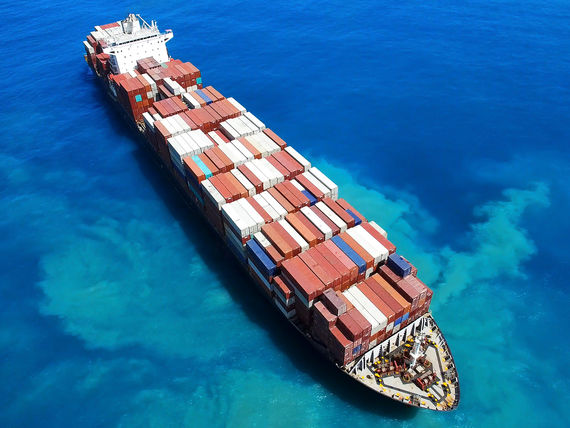Trendwatch: Temporary tariff relief brings on early transpacific peak season; U.S. Customs Faces ‘Huge Task’; 'Bitter-sweet' MEPC 83 follows COP 29, narrowing scope of climate commitments

Temporary tariff relief brings on early transpacific peak season
The container peak season on the transpacific trade could start as early as today – the latest tariff rollback from President Trump at the end of last week for electronic consumer goods likely to prompt a new wave of ex-Asia bookings.
After postponing implementation of the so-called reciprocal tariffs until 9 July, although maintaining a base 10% tariff rate, while at the same time raising tariffs on Chinese goods to 145%, The Loadstar reports today that shippers in countries such as Taiwan and Malaysia are already rushing to ship as many products within the 90-day window as possible.
U.S. Customs Faces ‘Huge Task’
U.S. Customs and Border Protection (CBP) “certainly has a huge task on its hand,” said a CBP Spokesperson in a statement to SupplyChainBrain April 12. “However, the agency is uniquely positioned to implement and enforce the President’s tariffs using all our enforcement and revenue collection authorities.”
The spokesperson said that CBP successfully implemented 13 tariff-related presidential actions during the Trump Administration and “each day collects over $200 million in tariff revenue.”
'Bitter-sweet' MEPC 83 follows COP 29, narrowing scope of climate commitments
IMO’s Marine Environment Protection Committee (MEPC) 83 meeting, meant to establish robust mid-term decarbonisation measures, ended with a disappointing conclusion, leaving shipping line customers, not regulations, to be the driving force for cleaner shipping.
After a vote, IMO’s first in over a decade, a watered-down version of a fuel standard for ships and a global pricing mechanism for emissions was adopted.
ACI ranks busiest air cargo gateways in 2024
Airports Council International (ACI) World, the airport trade association, has today (April 14) provided a first look at the 2024 rankings of the world’s busiest airports.
This initial data may be modified slightly when the full rankings are confirmed in July 2025, which will be based on detailed information from over 2,700 airports around the world.
South Africa Port Workers Warn of Strike as Pay Talks Fail
South Africa’s state-owned ports and freight rail company’s biggest union threatened strike action after wage talks collapsed, a move that may curb shipments of minerals and agricultural goods.
“The United National Transport Union and Transnet have officially reached a deadlock in the 2025-26 salary and wage negotiations following a failed conciliation process by the Commission for Conciliation, Mediation and Arbitration,” the union said in an April 14 statement.
Etihad ramps up cargo capacity
Etihad Cargo, the cargo and logistics arm of Abu Dhabi-based UAE flag-carrier Etihad Airways, has expanded its maindeck capacity by 18 percent to meet increasing demand in the Greater China market.
Additional capacity is being provided in the form of a wet-leased Boeing 747-F. The extra capacity is expected to support “increased freight movements on high-demand routes and provide customers with greater flexibility in shipping cargo to and from key markets”, the airline said.
Air cargo key to supply chain resilience: IATA
The International Air Transport Association (IATA) emphasised the vital role of air cargo in maintaining global supply chain resilience, and called on governments and industry to remain focused on delivering the fundamental expectations of customers - safety and security, digitalisation and sustainability.
“Whether supporting global trade, enabling e-commerce or delivering vital humanitarian aid, the value of air cargo has never been clearer," Brendan Sullivan, Global Head of Cargo, IATA said at the opening of the 18th World Cargo Symposium (WCS) in Dubai, UAE. "To meet customer expectations and navigate an increasingly complex environment, the air cargo industry must continuously strengthen safety and security, fast-track digitalisation and deliver on its sustainability commitments."
Port of Long Beach Claims Top Spot as U.S. Ports Brace for Trade War Hit
The Port of Long Beach has emerged as America’s busiest container port in the first quarter of 2025, achieving record-breaking cargo volumes ahead of what could be a dramatic downturn in inbound cargo volumes later in the year.
March proved exceptionally strong for Long Beach, with dockworkers processing 817,457 TEUs—a 25% increase from March 2024 and the port’s busiest March on record. The surge was driven primarily by imports, which grew 25.8% to 380,562 TEUs, while exports declined by 1%.
Asian maritime security in Q1 – surprising developments in the Singapore Strait
Risk Intelligence examines security incidents and concerns in Asian waters in the first quarter of 2025.
Of the maritime security developments in Asia during the first quarter, the return of container vessel boardings during Singapore Strait transits stood out. Such activity had gone unreported since early-September 2015, almost ten years ago.


